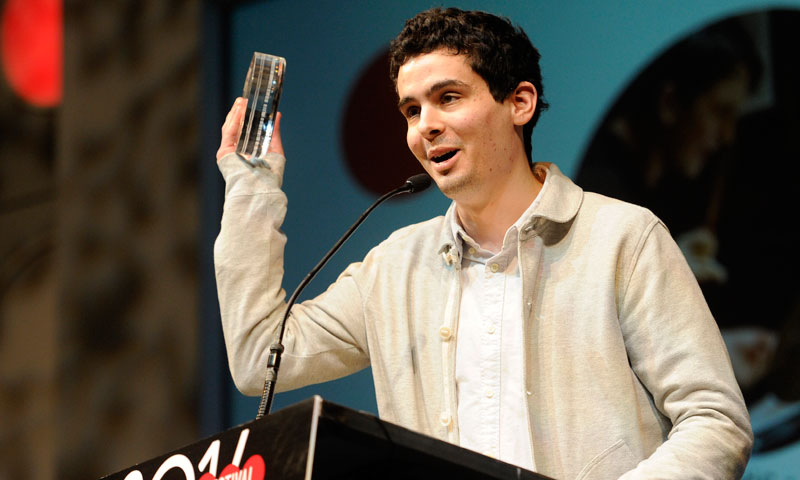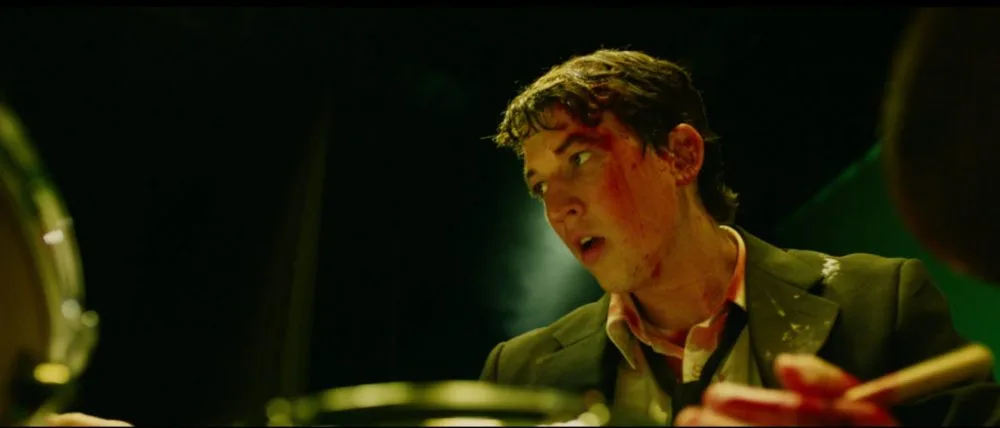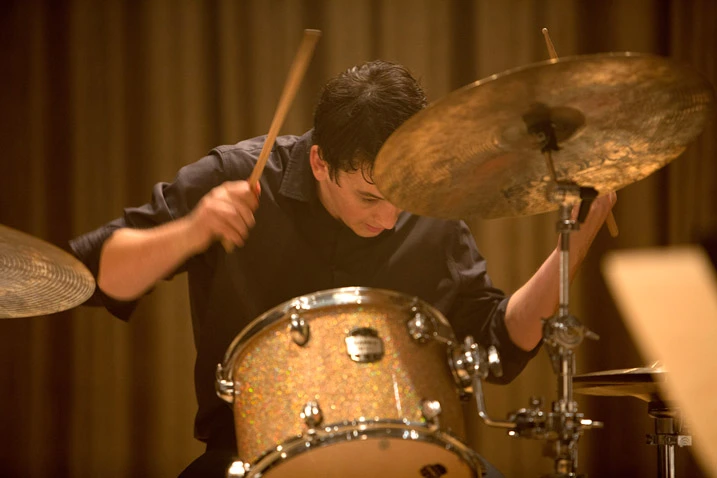The harsh reality behind the coveted traits of genius, hard work, and perfection is something that many of us are not aware of. The film "Whiplash," directed by Damien Chazelle and starring Miles Teller and J.K. Simmons, provides a thought-provoking answer to these questions. Released on October 10, 2014, the movie tells the story of a jazz drummer who strives to become a great artist at all costs under the drive of a cruel mentor. With a tense and thrilling rhythm and superb performances, the film explores the conflict and fusion between music and life, as well as an extreme educational philosophy and the darker side of human nature. This article will evaluate the strengths, weaknesses, and significance of the film from the aspects of music, plot, characters, and themes, as well as its inspiration and impact on the audience. It is believed that "Whiplash" is a highly recommended movie that not only allows us to appreciate the beauty and difficulty of jazz music but also encourages us to reflect on our own definitions of dreams, success, and happiness.
Background
Whiplash, a standout work from the up-and-coming director Damien Chazelle, was met with widespread acclaim upon release. A major contributing factor to its success was the fact that the film was based on Chazelle's own personal experience. In high school, Chazelle became enthralled with jazz drumming and even became a skilled jazz drummer himself. During this time, he encountered his own "Fletcher" - an extremely strict music teacher who pushed him to his limits. Under his teacher's influence, Chazelle eventually made it into the All-State jazz band, but not without immense pain and struggle. Ultimately, he was forced to abandon his dream of becoming a professional musician, but he managed to recreate this personal story on the silver screen through the art of film.
Chazelle adapted his unique experience into an 18-minute short film, which premiered at the Sundance Film Festival in 2013 and won both the Jury and Audience Awards. This success laid the foundation for his later feature film version of Whiplash. The feature film did not disappoint and received five Oscar nominations, including Best Picture, ultimately winning three awards for Best Supporting Actor, Best Editing, and Best Sound Mixing. Chazelle himself was also nominated for Best Adapted Screenplay. These achievements attest to his exceptional abilities as a newcomer in the film industry.

Story plot
The story follows Andrew, a 19-year-old drummer with a burning passion for music, as he navigates the turbulent world of jazz under the tutelage of the ruthless Fletcher. Andrew is willing to do whatever it takes to become the best, but as he dives deeper into the world of music, he becomes increasingly alienated from the outside world. Fletcher is the only one who seems to understand him, but his mercurial temperament puts their relationship to the test. As Andrew's obsession with perfection spirals out of control, he must confront the painful truth that his dream may come at too great a cost.
One particularly memorable scene in the film is when Andrew races to the competition venue, risking life and limb to achieve his goal. The scene is a testament to Andrew's unyielding determination and drive, but also underscores his fear of failure and the consequences that come with it. When Andrew finally reaches the stage, battered and bruised, he finds himself facing Fletcher's unrelenting criticism, which highlights the uncompromising nature of their relationship.

Another standout moment in "Whiplash" is the conversation between Andrew and Fletcher at a bar. Despite their previous clash, Fletcher unexpectedly shows warmth and understanding towards Andrew. He doesn't harbor resentment towards the reporter who got him fired, but rather apologizes to Andrew and shares his music philosophy and teaching methods. Fletcher admits that he is always searching for his own Charlie Parker, a talented musician who can exceed boundaries and become a legend. He justifies his tough-love approach, believing that cruelty can push students to reach their full potential and avoid settling for mediocrity. Fletcher even states that he would rather have his students hate him forever than let them abandon their dreams. This scene offers a glimpse of a different side to Fletcher, making the audience empathize with him and appreciate his dedication to his craft. Andrew also gains a new respect for Fletcher, leading him to accept the invitation to perform at Lincoln Center. However, the film's final climax reveals that Fletcher's apparent kindness and understanding may have been a calculated move to exact revenge against Andrew and ensure he has no place in the music world.
In the climax of the film, Andrew's performance at Lincoln Center is nothing short of exhilarating and impactful. It serves as the ultimate showdown and resolution between Andrew and Fletcher. Andrew learns that Fletcher has set him up to perform an unfamiliar piece, "Caravan," in an attempt to humiliate him and take revenge for his previous complaint. Andrew falls right into Fletcher's trap, delivering a subpar performance that leaves the audience and judges unimpressed. But just when Andrew is ready to leave the stage, he turns back and begins to play his own piece, "Whiplash." It is a bold act of rebellion against Fletcher and a challenge to his own limitations. Andrew refuses to be manipulated or give up on his dreams, using his music to showcase his worth. His performance is filled with passion and inspiration, leaving the audience and judges in awe. Initially, Fletcher tries to stop him, but eventually succumbs to Andrew's music and directs the band to accompany him. The two engage in a thrilling musical dialogue on stage, stimulating and supporting each other, reaching the peak of their musical abilities. Andrew's performance lasts nearly ten minutes and ends with a resounding drumbeat. The audience bursts into applause, and Andrew and Fletcher exchange a smile, as if they have reached a silent understanding and reconciliation.

The Lincoln Center scene is the pinnacle of the film's emotional impact, perfectly conveying the complex and intricate relationship between Andrew and Fletcher. Here, Andrew transcends himself and achieves his dream, earning Fletcher's respect and recognition. But this triumph comes at a steep cost - Andrew sacrifices his health, love life, and possibly even his future. In this moment, he becomes just like Fletcher - a musician who will stop at nothing to pursue his passion. It's a result that Fletcher may have desired all along.
The film's ending is open-ended, leaving the audience to ponder what will happen to Andrew and Fletcher next. Will Andrew continue his pursuit of music? Will he rekindle his love life? Will he regret his choices? Similarly, will Fletcher change his methods or feel remorse for his past actions? We may never know, but what we do know is that on that stage, at that moment, in that music, they both achieved what they had been striving for.
Perfect or Madness?
Fletcher is an artist who has an unwavering dedication to music, with exceedingly high standards and expectations. His teaching style is both strict and relentless, characterized by the use of extreme measures such as throwing chairs, slapping, insulting, and deceiving his students. His ultimate goal is to cultivate exceptional jazz drummers, whom he believes can only be produced through such rigorous and demanding methods. He sees it as his duty to contribute to the music industry and discover the next Charlie Parker.
Was Fletcher's approach cruel or motivating? Was it effective or harmful? Was it just or evil? Different people may have different answers, but one thing we cannot deny is the immense harm and trauma that Fletcher's approach caused to his students. Not only did he shatter their confidence and self-esteem, but he also destroyed their relationships and quality of life. He even drove one student to commit suicide and forced another to drop out of school. He disregarded his students' individuality and feelings, and showed no concern for their growth and happiness. He only cared about his own goals and ideals, and was driven by his desire for control and revenge.
The movie reminds us that education should not be like this. Education should be centered around the human experience, based on love, guided by methods, and aimed at achievement. Education should cultivate students' interests and passions, stimulate their creativity and critical thinking, respect their choices and aspirations, and prioritize their physical and mental health and social integration. Education should be about interaction and cooperation, not oppression and competition. Education should empower and enlighten, not harm and deprive.
As for whether Fletcher's approach was perfect or insane, dedicated or obsessive, selfless or selfish, opinions may differ. However, in my view, Fletcher's approach caused immense damage and distortion to music. He only cared about his own standards and goals, and pursued his idea of a perfect performance, chasing the elusive spirit of Charlie Parker. I once questioned whether this approach aligned with the original essence of music. He turned music into a tool and weapon, rather than an art form and expression. He transformed music into a battlefield, rather than a space for collaboration and sharing. In my opinion, music should be an emotional and meaningful form of artistic expression, and the appreciation of music should be accessible to all. However, in the pursuit of the perfect performance, does this approach cause us to lose the vitality and emotional connection that should be at the core of music? Music should be alive.
The movie emphasizes that art should not be approached in this manner. Art should be an inspiration for creation, a platform for communication and exchange, a means for expressing emotion and meaning. Art should be inclusive and diverse, exploratory and discovering, respectful and appreciative. Art should be a place of freedom and openness, where expression and reflection are encouraged, and critical thinking leads to transformative action. Art should be a reflection of life and the soul, a source of beauty and magic, and a means of transcendence and sublimation.
Epilogue
"Whiplash" is a movie that shocks and makes people think. It showcases the pursuit of education and art at its extreme, as well as revealing the dialectical relationship between education and art. The film prompts us to reflect on what education and art should be like, how we should treat our dreams and talents, how we should balance our ideals and reality, and how we should persevere and break through in the face of setbacks and difficulties. The film does not provide a clear answer but instead leaves us to explore and discover for ourselves.
At the end of the film, under Fletcher's direction, Andrew completes a world-shattering jazz drum solo. They share a smile, as if they have reached a kind of understanding and recognition. What kind of understanding and recognition is this? Is it a compromise or a transcendence of education and art? These questions may not have a standard answer, but rather depend on our own understanding and feelings.
"Whiplash" is a movie worth watching and contemplating multiple times. It not only allows us to feel the power and beauty of music but also allows us to experience the hardships and glory of life.
